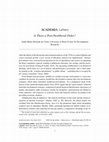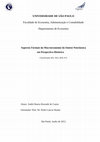Papers by André Bueno Rezende de Castro

Academia Letters, 2021
After the failure of the Keynesian interventionist policies of the 1970s to control inflation and... more After the failure of the Keynesian interventionist policies of the 1970s to control inflation and secure consistent growth, a new version of liberalism started to be implemented. 1 Western governments were criticised by having been too lax at expenditures and careless in expanding the State's regulatory capacity, leading to inflationary pressures, low savings, and few incentives for investments (Chang & Grabel, 2014). The upcoming neoliberalism is an ahistorical ideology, which draws in a set of policies and performance assessments, and is often taken for granted as the "common denominator" in public debate-something that is accepted by all "serious economists" (Gore, 2000). Even though macroeconomic stability in a market economy environment is a necessary condition for growth, all countries should have the freedom to pursue their own development strategies, which often contradicts neoliberal prescriptions. In a comparative study of the history of the current developed nations, Fiori (2014) argues that the "great winners" followed heterodox development strategies, comprised of partial financial liberalisation, inexistence of patents and property rights assurances (mostly for foreigners), protectionism not limited to infant industries, and expansive or restrictive fiscal and monetary policies according to the prevailing economic situation. Globalisation may be defined as "the removal of barriers to free trade and the closed integration of national economies" (Stiglitz, 2002, p. IX). However, the labour market was excluded from this liberalisation frenzy, since it is the production input which developing countries have in abundance (Rodrik, 2002), potentially harming low-skilled workers in industrialised countries and rendering low-income nations a comparative advantage in the in-1 The election of conservative politicians in central countries such as USA, Germany and the UK was instrumental in this "paradigm shift" as well (Gore, 2000).
The purpose of this project is to determine whether the inflation rate of a specific set of count... more The purpose of this project is to determine whether the inflation rate of a specific set of countries and regions can be described by a normal distribution and how their descriptive statistics – such as mean, standard deviation, kurtosis, skewness – behave. A secondary purpose of this project is to determine whether the consumer prices index (CPI) and the gross domestic product (GDP) deflator differ in this regard. Finally this project will test both the CPI and the GDP deflator for autocorrelation of order 1.

The objective of this undergraduate thesis is to study in historical perspective, through a theor... more The objective of this undergraduate thesis is to study in historical perspective, through a theoretical analysis, how the neoclassical synthesis was formed by investigating the hypothesis that there would have been a macroeconomic consensus. Macroeconomics has always been characterized as a field in intense ideological dispute, however it is possible that a consensus was brought about in the 1950s-1960s in respect to some core propositions characteristics of a research program that emerged after the Keynesian Revolution, but conserved influences of the classical microeconomic framework. This study also conducted a survey, using articles of the time, on the definition of neoclassical synthesis, aiming to determine whether it was given only a posteriori, which would allow to state that the leading economists of the period of the so-called "neoclassical synthesis" shared a theoretical core, nevertheless they did not invariably worked with the same issues and with the same goals.
This paper investigates the relationships between economic inequalities and economic growth in bo... more This paper investigates the relationships between economic inequalities and economic growth in both theoretical terms and in a case-study of Brazil.










Uploads
Papers by André Bueno Rezende de Castro